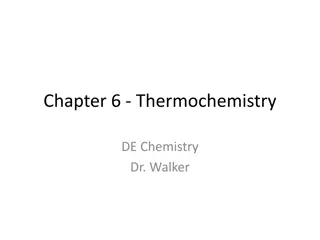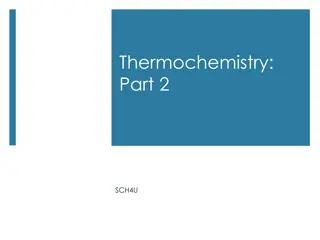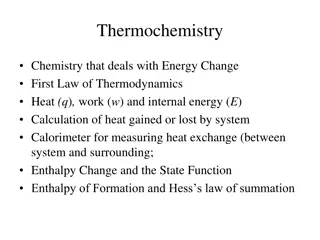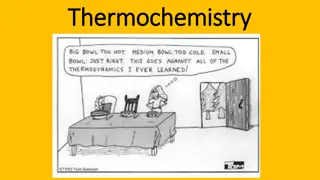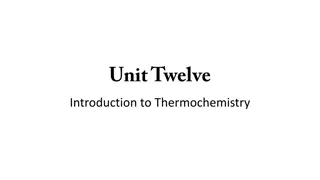Chapter 5: Thermochemistry
Thermochemistry, as explored in Chapter 5 by Jennie L. Borders, delves into the study of energy and its conversions, focusing on various forms such as kinetic, potential, electrostatic, chemical, and thermal energy. The chapter discusses concepts like work, heat, and the nature of energy in relation
2 views • 56 slides
Understanding Thermochemistry Concepts
Explore essential thermochemistry topics through a series of questions covering temperature scales, heat transfer, phase changes of water, and more. Test your knowledge and deepen your understanding of key concepts in thermochemistry.
0 views • 24 slides
Understanding Thermochemistry: Key Concepts and Examples
Energy is fundamental in thermochemistry, where we explore its conversion forms, such as potential and kinetic energy. State functions and chemical energy play crucial roles in exothermic and endothermic reactions, affecting stability and bonds. Dive into the world of energy transformations with pra
0 views • 49 slides
Understanding Thermochemistry: Heat, Physical Changes, and Methods of Measurement
Thermochemistry delves into heat, physical changes, and various methods of measuring enthalpy, including calorimetry, Hess's Law, standard enthalpy of formation, and bond energies. Specific heat capacity is crucial for determining the amount of heat absorbed or released during a temperature change.
1 views • 27 slides
Basics of Thermochemistry and Energy Changes in Chemistry
Thermochemistry in chemistry involves energy change, the First Law of Thermodynamics, and concepts like heat, work, and internal energy. It explores calculations of heat exchange using calorimeters, Enthalpy Change, Enthalpy of Formation, and more. Energy basics cover the importance of energy change
0 views • 53 slides
Thermochemistry Problem Practice and Solutions
Practice and solutions for thermochemistry problems involving energy calculations, temperature conversions, and phase changes. Includes calculations for melting ice, converting temperature to joules, and determining energy required for heating substances.
0 views • 14 slides
Understanding Thermochemistry: Heat, Temperature, and Enthalpy
Thermochemistry is the study of heat energy associated with chemical and physical changes. It involves understanding concepts like heat transfer, temperature, enthalpy, and specific heat capacity. By exploring these principles, we can analyze heat changes in systems and calculate energy requirements
0 views • 11 slides
Exploring Thermochemistry and Heat Energy Transfer
Thermochemistry involves the transfer of heat energy during chemical reactions and physical changes. Understanding concepts like enthalpy, heat capacity, and energy flow is crucial. The high heat capacity of water plays a vital role in moderating temperature changes in the environment. The law of co
0 views • 16 slides


